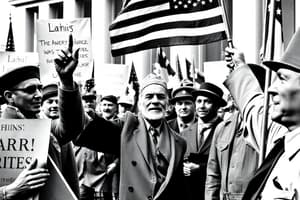Podcast
Questions and Answers
Which of the following values is NOT promoted by capitalism?
Which of the following values is NOT promoted by capitalism?
- Self-Direction
- Common Ownership (correct)
- Private Property
- Social Mobility
Socialism endorses the concept of private property.
Socialism endorses the concept of private property.
False (B)
What is the main responsibility of individuals according to the value of self-direction in capitalism?
What is the main responsibility of individuals according to the value of self-direction in capitalism?
to shape their own future
Capitalism promotes myths of social mobility primarily for the ______ and able members of the community.
Capitalism promotes myths of social mobility primarily for the ______ and able members of the community.
Match the following concepts with their corresponding principles:
Match the following concepts with their corresponding principles:
What is the biblical concept of sedakah commonly translated as?
What is the biblical concept of sedakah commonly translated as?
The New Testament emphasizes justice primarily within the context of individual rights.
The New Testament emphasizes justice primarily within the context of individual rights.
What does the term 'mishpath' refer to in the context of the Old Testament?
What does the term 'mishpath' refer to in the context of the Old Testament?
What did Tertullian describe as a way to support those in need?
What did Tertullian describe as a way to support those in need?
The early Church actively sought to establish social justice within their communities.
The early Church actively sought to establish social justice within their communities.
In the early Christian community, members were encouraged to give to those in need, as shown in Acts ______.
In the early Christian community, members were encouraged to give to those in need, as shown in Acts ______.
What two ideologies emerged from the Industrial Revolution?
What two ideologies emerged from the Industrial Revolution?
Match the following terms to their meanings regarding Catholic Social Teaching:
Match the following terms to their meanings regarding Catholic Social Teaching:
Name one of the three requirements for a just war according to St. Thomas Aquinas.
Name one of the three requirements for a just war according to St. Thomas Aquinas.
The Age of Enlightenment valued obedience and faith over reason.
The Age of Enlightenment valued obedience and faith over reason.
Who argued that acquisition of property must be justified through legitimate labor?
Who argued that acquisition of property must be justified through legitimate labor?
Which of the following best describes Christ's role as a Teacher?
Which of the following best describes Christ's role as a Teacher?
Evangelical poverty is a counter witness to the growing __________ of the world.
Evangelical poverty is a counter witness to the growing __________ of the world.
The idea of justice in the Old Testament is only concerned with individual morality.
The idea of justice in the Old Testament is only concerned with individual morality.
Match the following figures with their contributions or associations:
Match the following figures with their contributions or associations:
The phrase 'spoilage' in John Locke's doctrine suggests a limit to private property ownership based on __________.
The phrase 'spoilage' in John Locke's doctrine suggests a limit to private property ownership based on __________.
Match the following terms with their definitions:
Match the following terms with their definitions:
What is the primary focus of Christ's message regarding the Kingdom of God?
What is the primary focus of Christ's message regarding the Kingdom of God?
Which concept refers to considerations on 'why' we are going into war?
Which concept refers to considerations on 'why' we are going into war?
According to St. Thomas Aquinas, 'justice' is defined as a habit where man gives what he owes to others.
According to St. Thomas Aquinas, 'justice' is defined as a habit where man gives what he owes to others.
What was one of the key consequences of the rise of factories during the Industrial Revolution?
What was one of the key consequences of the rise of factories during the Industrial Revolution?
Private property in the context of capitalism implies exclusive use by the owner.
Private property in the context of capitalism implies exclusive use by the owner.
What is the primary goal of the early Church as mentioned in the context?
What is the primary goal of the early Church as mentioned in the context?
What major societal change is associated with the Enlightenment period?
What major societal change is associated with the Enlightenment period?
Flashcards
What does the Bible reveal about God's interest in the world?
What does the Bible reveal about God's interest in the world?
The Bible, as a source of Catholic Social Teaching, reveals a God who is concerned with the world, history, and the way humans live in communities.
What is Sedakah and how does it relate to justice?
What is Sedakah and how does it relate to justice?
Sedakah, often translated as righteousness, emphasizes more than just following rules. It's about living a righteous life with social consequences; it's about living a just life within the community.
What does Mishpath represent in relation to justice?
What does Mishpath represent in relation to justice?
Mishpath, meaning 'to judge,' is not about God simply punishing or rewarding individuals. It's about God's rule maintaining order in society.
How do Sedakah and Mishpath relate to justice and charity in the New Testament?
How do Sedakah and Mishpath relate to justice and charity in the New Testament?
Signup and view all the flashcards
What emphasis does Christ's teaching place on justice and charity?
What emphasis does Christ's teaching place on justice and charity?
Signup and view all the flashcards
What is 'metanoia' and how does it relate to Christ's teachings?
What is 'metanoia' and how does it relate to Christ's teachings?
Signup and view all the flashcards
What is the nature of Christ's liberation?
What is the nature of Christ's liberation?
Signup and view all the flashcards
What was the social involvement of the early Christian community?
What was the social involvement of the early Christian community?
Signup and view all the flashcards
Social Mobility in Capitalism
Social Mobility in Capitalism
Signup and view all the flashcards
Self-Direction in Capitalism
Self-Direction in Capitalism
Signup and view all the flashcards
Socialist Critique of Capitalism
Socialist Critique of Capitalism
Signup and view all the flashcards
Common Ownership in Socialism
Common Ownership in Socialism
Signup and view all the flashcards
Government Control in Socialism
Government Control in Socialism
Signup and view all the flashcards
Deposits of Piety
Deposits of Piety
Signup and view all the flashcards
Early Church Practices
Early Church Practices
Signup and view all the flashcards
Justice in Distribution of Wealth
Justice in Distribution of Wealth
Signup and view all the flashcards
Just Cause for War
Just Cause for War
Signup and view all the flashcards
Right Intention in War
Right Intention in War
Signup and view all the flashcards
Just War: Jus ad Bellum
Just War: Jus ad Bellum
Signup and view all the flashcards
Just War: Jus in Bello
Just War: Jus in Bello
Signup and view all the flashcards
Evangelical Poverty
Evangelical Poverty
Signup and view all the flashcards
Enlightenment vs. Middle Ages
Enlightenment vs. Middle Ages
Signup and view all the flashcards
The Industrial Revolution
The Industrial Revolution
Signup and view all the flashcards
What is Capitalism?
What is Capitalism?
Signup and view all the flashcards
Locke's Labor Theory
Locke's Labor Theory
Signup and view all the flashcards
Spoilage Limit
Spoilage Limit
Signup and view all the flashcards
Money's Effect on Spoilage
Money's Effect on Spoilage
Signup and view all the flashcards
Modern vs. Aquinas' Private Property
Modern vs. Aquinas' Private Property
Signup and view all the flashcards
Study Notes
Historical Development of Catholic Social Teaching
- The Bible forms the foundation of Judeo-Christian vision of life.
- The Bible highlights God's interest in the world, human history, and how humans live in community.
- The Old Testament concept of justice includes 'sedakah' (righteousness/justice) and 'mishpath' (judgment).
- Sedakah involves fidelity to relationships and has social character, going beyond personal righteousness.
- Mishpath emphasizes God's governance, aiming to create order in society.
- Both concepts are understood in context of God's governance. This perspective shapes relationships with God and fellow humans within the community.
- The New Testament emphasizes Christ's role in teaching, liberation, and community.
- Christ's teachings focused on people over laws, prioritizing justice and charity over legal codes. (Luke 10:25-37)
- Christ calls people to metanoia (conversion of heart) . This is presented as a hopeful and non-violent process towards the realization of the Kingdom of God in the future.
- Christ's liberation extends to both physical and spiritual illnesses.
- Christ's teachings are a model for societal restoration (personal & communal).
- Early Christians attempted to imitate Christ's examples in their social interactions.
- Early Christians practiced generosity (Acts 2:44-45; 20:35; Tim 6:17-19).
- Early Christians fostered unity and solidarity. (Gal 3:28; Col 3:11)
- Early Christians also implemented deposits of piety (according to Tertullian), using funds for the needy, burial, support of youths and maidens, aged care, and relief for shipwrecked people.
- The Catholic Church responded to the social issues of the 18th and 19th centuries, resulting in the publication of the first social encyclical, Rerum Novarum (RN).
- The Early Church (first 500 years), the time of Constantine (Edict of Milan 313), Theodosius I (389-391), and the Middle Ages followed different social and religious developments and challenges.
- The Council of Nicea in 325 had a significant impact, marking an important time in the institutionalization of the Church within the Roman Empire, maintaining its role as a social justice advocate.
- St. Thomas Aquinas discussed the distribution of wealth, highlighting the importance of justice in ensuring each person receives what is due to them through constant and perpetual will.
- The ideas of just war (jus ad bellum and jus in bello), were considered necessary for understanding conflict.
- St. Thomas Aquinas defined the conditions for a justified war, including legitimate authority, a just cause, and a right intention.
- During the enlightenment period there was significant shift in ideologies, and the church responded, with the emerging social questions.
- The Industrial Revolution and the birth of Capitalism and Socialism brought about significant social upheaval, and the church adapted, creating and modifying its social teachings based on the needs and circumstances of the era.
- The growth of Capitalism was a central ideology during this period, which prompted criticism due to its impact on social equality and wealth distribution.
- Private property was also challenged by these opposing viewpoints.
- John Locke's concept of property rights based on labor, highlighting the link between labor and entitlement, had significant implications.
- Two key concepts, social mobility and self-direction were central characteristics of this period.
- However, there were also opposing views against Capitalism and its implications on social justice.
- Concepts such as common ownership, the need for social justice, and the importance of wealth distribution are presented as alternatives to the capitalist model, providing a perspective for the evolution of Catholic Social Teaching.
- In response, the Church reacted by updating social teachings in line with modern concerns, social conditions, and needs.
Studying That Suits You
Use AI to generate personalized quizzes and flashcards to suit your learning preferences.
Related Documents
Description
Test your understanding of capitalism, socialism, and the role of social justice in early Christianity. This quiz covers key concepts from the biblical principles of sedakah and mishpath to the ideologies that emerged during the Industrial Revolution. Dive into the values and responsibilities emphasized in these socio-economic systems.





